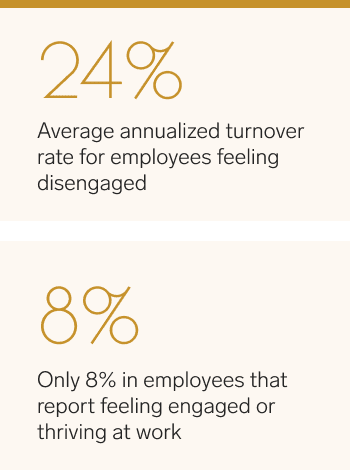By Modern Health
Top talent is leaving their current jobs in search of workplaces that will better support their wellbeing and reduce their chronic stress. With already fierce competition to attract and retain these key players, HR and other business leaders are developing evidence-based retention strategies focused on mental health.
Working for several years during a seemingly unending global pandemic has left a lot of employees exhausted and burnt out. Many are looking for new jobs, hoping to ease the chronic stress of their day-to-day—and they’re looking for employers to help them in that effort.
The relationship between mental health and employee turnover may have boiled over during the COVID-19 pandemic, but the tension between the two was simmering long before. In a 2021 survey from the Harvard Business Review, 50% of respondents stated they’d left a job in part due to mental health reasons. That percentage has only increased over the last few years, with few signs of slowing down.
Even if turnover rates drop, retention will continue to be a fact of life for HR and other business leaders, who need to increasingly consider evidence-based strategies that can accommodate their workforce’s mental health needs.
Modern Health, an industry leader in mental health services and resources for workplaces around the globe, has released a free eBook to help strengthen your retention toolkit: Employee Retention Strategies for Organizational Success. This robust resource offers a step-by-step guide to implementing strategies focused on mental health, diversity, inclusion, and organizational development that can help to reduce turnover, improve engagement, and increase productivity in a global workforce.
Find out more
Mental Health Drives Engagement and Retention
The way a person feels about showing up to their workplace every day is going to have a direct impact on their professional performance—and the research proves it. A Gallup analysis identified the compounding effect mental distress and disengagement (showing up for work but giving minimal effort) have on turnover.

Employees who don’t feel like they’re thriving or engaged with their work had an annualized turnover rate of 24%, compared to 8% for employees who reported thriving and feeling engaged at work, highlighting the stark contrast between these two groups.
One significant mental health issue in the workplace is burnout—a syndrome characterized by exhaustion, cynicism, and feelings of professional inefficacy. Burnout is a consequence of unmanaged work stress, and the American Psychological Association’s 2021 Work and Well-being survey found that employees who feel stressed are more than three times as likely to say they intend to seek employment elsewhere compared to their less-stressed co-workers.
The causes of chronic workplace stress will vary from person to person, but some commonly cited triggers include:
- Low salaries
- Unrealistic expectations
- Insufficient opportunity to participate in decision-making
- Roadblocks to advancement and development
Investing in Employee Mental Health is an Investment in Organizational Success
According to the aforementioned APA survey, 37% of respondents overall (and 43% of those ages 18 to 24) said their employer could create a more psychologically healthy work environment by providing mental health resources. This makes the demand for mental health support clear. Employees feel they need it to perform their best at work, and businesses will benefit from reduced turnover and the costs associated with it.
- Direct costs
- Recruitment
- Training and onboarding
- Severance
- Indirect costs
- Lost knowledge
- Lost productivity during a transition
- Lower co-worker morale and motivation (which can trigger turnover contagion)
Knowing these costs and their specific application to your business can help human resource managers to build the business case for investing in retention strategies focused on mental health.
Download this free White Paper now
5 Steps to Building Your Business Case for Bolstering Retention
1. Know your turnover rate
There’s no universally-accepted formula to calculate turnover, but ISO 30414:2018—an international standard for human capital reporting—recommends dividing the total number of employees who left their job by the total number of employees in the organization at the beginning of a given period. Use this turnover rate to calculate your organization’s turnover costs as well.
2. Devise an evidence-based retention strategy
This includes developing an evidence-based recruitment strategy at the start of a new working relationship. The same elements that will attract top talent to your organization are many of the same elements that will need to be incorporated into your retention strategy to keep that same talent. For example: offer a variety of best-in-class modalities of mental health support and show off a culture that exemplifies a mindful, supportive, and inclusive leadership/management team.
3. Strengthen support for mental health
With a workforce that’s been effectively recruited and onboarded, mental health support—interwoven with diversity, equity, inclusion, and belonging (DEIB)—is essential to employee retention.
4. Weave DEI&B into all other strategies
Diversity, equity, inclusion, and belonging are important initiatives that can benefit companies. Retention, job satisfaction, and organizational commitment improve when social identities of diverse employees are recognized and appreciated, helping them to feel valued by their organization.
5. Proactively remedy organizational causes of chronic job stress
These include compensation shortfalls, excessive job demands, lack of autonomy, and insufficient opportunity for advancement and development. Psychological health and safety improvement processes can help employers identify the harmful stressors specific to their organizations and identify practical improvement strategies.
A Holistic Approach to Mental Health is the Answer to Retention Woes
When it comes to supporting mental health, there’s always a cost to doing something, but it must be weighed against the cost of doing nothing. More than half of HR leaders and C-level executives, according to Modern Health data, worry that insufficient mental health support will have their employees heading for the door. Their fears are well-founded.
The best counter to fear is knowledge. Modern Health’s latest (and free!) eBook is a robust resource for learning the key steps to building this crucial strategy while demonstrating the demand for stress reduction, burnout prevention, and mental health support at work.
Disclaimer: The views expressed in the article are those of third parties. They do not purport to reflect the opinions or views of Collective Health or its members.



